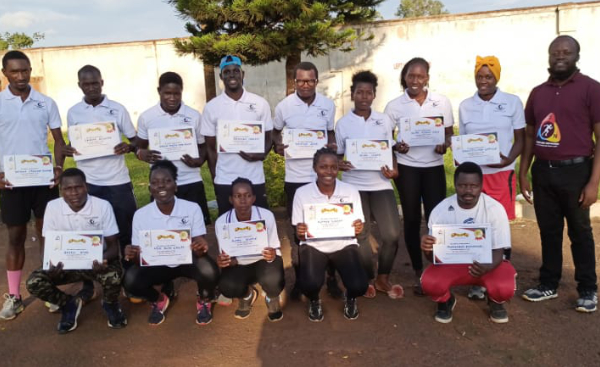We have also initiated two very dedicated programs, one focusing on developing life skills among youth and adults alike.
This program, the Life Skills Program, uses sports combined with a set curriculum to teach individuals important life skills, such as communication, collaboration, and employability skills.

Another dedicated program that we run is the Youth Leadership program, which trains youth sports players, captains, etc., to take leadership and coaching roles in the community. The purpose of this program is to not only develop and instill these valuable skills within youth, but also to create a foundation for long-term leadership development, where youth teach their peers, friends, team-mates, the values of growth and support that we instilled within them.
Life Skills Coach Training Courses
This program is designed by a sports aid network to train and certify qualified sports officials as Life Skills Coaches. A coach is a trained instructor and group facilitator, qualified to bring his athletes to competency in a specific range of problem-solving skills for use in the following areas: self, relationships and family, education and employment, and leisure and community.
Based on our Model of Life Skills, coaches use structured lessons in combination with group dynamics to provide athletes with the necessary skills to both coach individuals and deliver community life skills programs. Training can be divided into four major areas of competence:
- Creative Problem Solving
- Structured Human
- Relations Training
- Coaching Techniques
- Life Skills Course Content
This program is also designed with the Life Coaching section. The learners will practice their skills in all of the 11 Core Competencies as defined by the International Coaching Federation (ICF). Coaches or the learners will learn about ethics, establishing agreements (contracts, guidelines, etc.), creating trust and mutual respect, and how to open and close a coach/client relationship.
Course Objectives
The principal objective of the Life Skills Coach Training Program is to facilitate coaches’ or athletes’ acquisition of the life skills required to develop and deliver programs in the community. Coaches must demonstrate a voluntary use of these required skills and the ability to transfer them into real-life situations.
Before the end of this course, learners will demonstrate the following:
1) Theory and Knowledge
- Defining Life Skills
- Understanding the theory, principles, and methods of Life Skills
- The ethics of coaching
2) Human Relations and Basic Communication Skills
- Becoming aware of one’s effect on others
- Displaying the ability to express and share feelings and self-disclose appropriately
- Demonstrating a positive self-concept
- Distinguishing own needs from those of others
- Remaining accountable for one’s own feelings, attitudes, and beliefs
- Displaying fairness and lack of prejudice
- Recognizing own limits
3) Individual Coaching
- Assisting clients to enhance self-concept and self-esteem
- Helping clients adjust to change
- Detecting lack of understanding
- Identifying and resolving interpersonal problems
- Encouraging independence and self-confidence
- Facilitating resolution of clients’ issues
- Demonstrating skills using real-life problems
- Transfer skills to everyday life
4) Group Dynamics
- Understanding and dealing with group dynamics effectively
- Planning group activities
- Delegating responsibility
5) Lesson Preparation and Presentation
- Understanding individual learning styles
- Communicating at the learner’s level
- Motivating group members
- Presentation of lessons in the five-phase format
- Sequencing lessons appropriately
- Adapting lessons to different groups
- Selecting appropriate techniques and learning aids
- Setting behavioral objectives
6) Evaluation Skills
- Defining goals and expected outcomes
- Explaining evaluation process
- Analyzing learners progress
- Terminating inappropriate trainees
- Assisting learners to devise self-evaluation strategies

